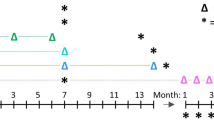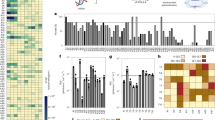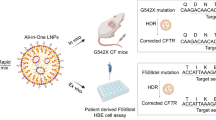Abstract
Phase 1 clinical trials of liposome-mediated gene therapy for cystic fibrosis have been completed and in all cases the expression level achieved has been low and transient. Clearly, improvements in the efficiency of gene transfer are required. It is now being recognised that delivery of high doses of DNA/liposomes to the mouse airway epithelium can achieve reproducible evidence of transgene, but is often associated with an unacceptable level of inflammation/ toxicity. It has recently been shown that instillation of bacterial DNA causes inflammation in the lower respiratory tract of rodents. The increased number and unmethylated status of CpG motifs, particularly when present in a particular base context, was identified as an important factor in this response. It was suggested that the immune system recognises this molecular pattern as ‘foreign’ thus activating appropriate immune responses. We have found that methylation of DNA decreases the level of several inflammatory cytokines in lavage fluid and surprisingly has a differential effect on expression of the plasmids pCMV CFTR-int6ab and pCMV CAT which only differ in the actual transcription cassette. The severe lung pathology observed did not show a corresponding decrease with methylation suggesting that these cytokines are not the only contributors to the toxicity/inflammation observed.
This is a preview of subscription content, access via your institution
Access options
Subscribe to this journal
Receive 12 print issues and online access
$259.00 per year
only $21.58 per issue
Buy this article
- Purchase on Springer Link
- Instant access to full article PDF
Prices may be subject to local taxes which are calculated during checkout






Similar content being viewed by others
References
Boucher RC . Current status of CF gene therapy Trends Genet 1996 12: 81–84
Scheule RK et al. Basis of pulmonary toxicity associated with cationic lipid-mediated gene transfer to the mammalian lung Hum Gene Ther 1997 8: 689–707
Schwartz DA et al. CpG motifs in bacterial DNA cause inflammation in the lower respiratory tract J Clin Invest 1997 100: 68–73
Krieg AM et al. CpG motifs in bacterial DNA trigger direct B-cell activation Nature 1995 374: 546–549
Freimark BD et al. Cationic lipids enhance cytokine and cell influx levels in the lung following administration of plasmid:cationic lipid complexes J Immunol 1998 160: 4580–4586
Yew NS et al. Contribution of plasmid DNA to inflammation in the lung after administration of cationic lipid:pDNA complexes Hum Gene Ther 1999 10: 223–234
McLachlan G et al. Evaluation in vitro and in vivo of cationic liposome-expression construct complexes for cystic fibrosis gene therapy Gene Therapy 1995 2: 614–622
McLachlan G et al. Laboratory and clinical studies in support of cystic fibrosis gene therapy using pCMV-CFTR-DOTAP Gene Therapy 1996 3: 1113–1123
Davidson DJ et al. Lung disease in the cystic fibrosis mouse exposed to bacterial pathogens Nature 1995 9: 351–357
Acknowledgements
We are grateful to June Stewart (Department of Pathology, University of Edinburgh) for the immunohistochemistry and to Boehringer Mannheim for the production of plasmid DNA and transfection reagents. We are also grateful to Chris Boyd and Gillian Morrison for advice and discussion. The work was funded by the CF Trust (grant PJ 449) and by the UK Medical Research Council.
Author information
Authors and Affiliations
Rights and permissions
About this article
Cite this article
McLachlan, G., Stevenson, B., Davidson, D. et al. Bacterial DNA is implicated in the inflammatory response to delivery of DNA/DOTAP to mouse lungs. Gene Ther 7, 384–392 (2000). https://doi.org/10.1038/sj.gt.3301097
Received:
Accepted:
Published:
Issue Date:
DOI: https://doi.org/10.1038/sj.gt.3301097
Keywords
This article is cited by
-
Identification and removal of colanic acid from plasmid DNA preparations: implications for gene therapy
Gene Therapy (2010)
-
TLR9 and IRF3 Cooperate to Induce a Systemic Inflammatory Response in Mice Injected With Liposome:DNA
Molecular Therapy (2010)
-
Systemic Delivery of DNA or siRNA Mediated by Linear Polyethylenimine (L-PEI) Does Not Induce an Inflammatory Response
Pharmaceutical Research (2008)
-
CpG-free plasmids confer reduced inflammation and sustained pulmonary gene expression
Nature Biotechnology (2008)
-
Electroporation-mediated transfer of plasmids to the lung results in reduced TLR9 signaling and inflammation
Gene Therapy (2007)



